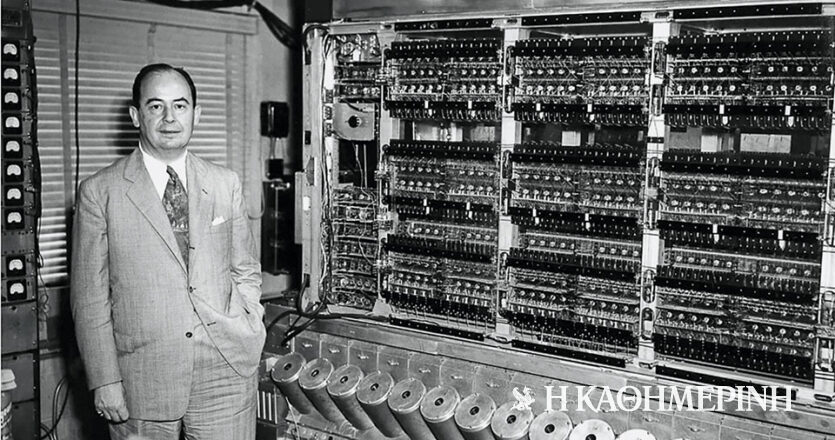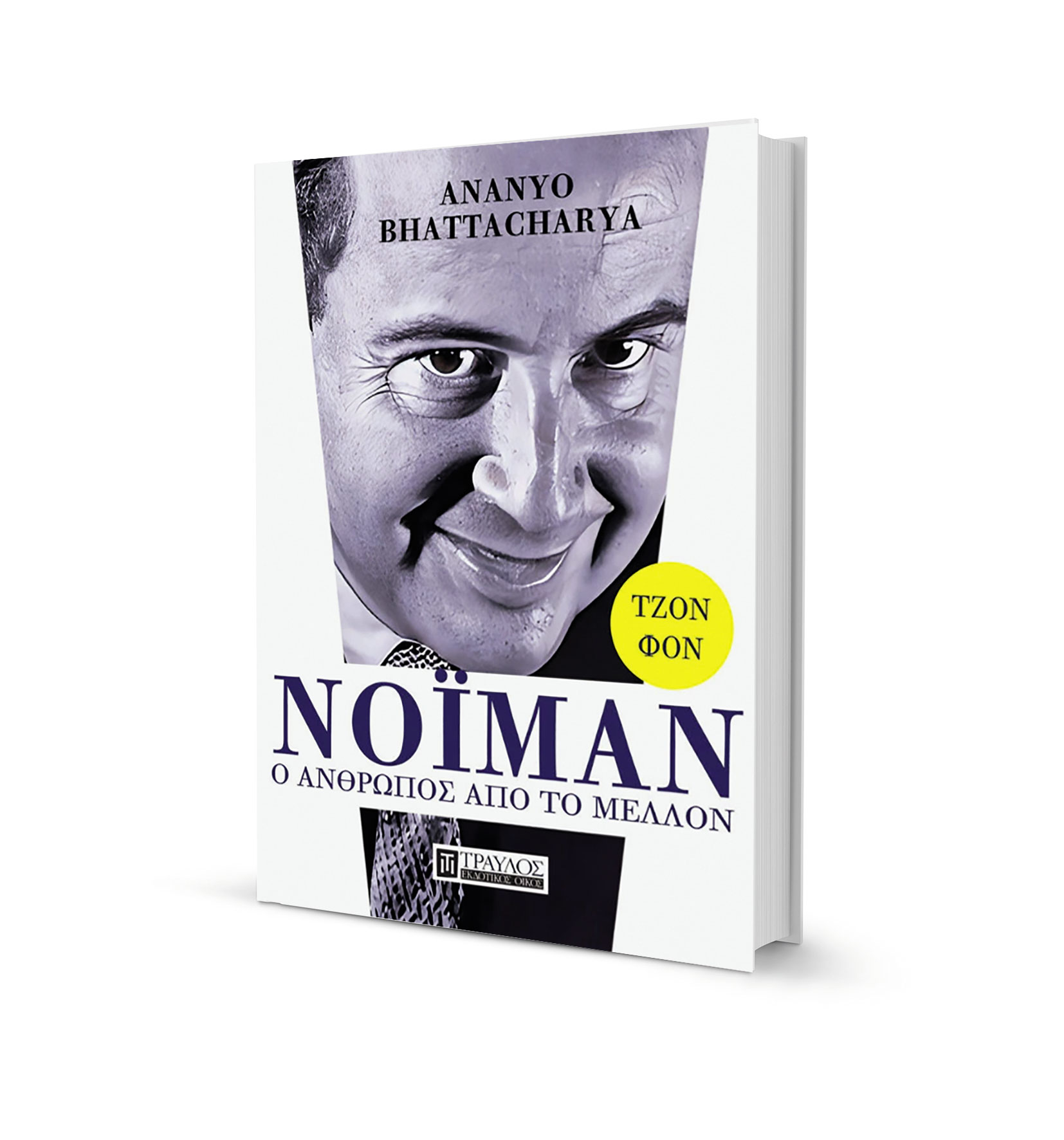
John von Neumann in front of a computer he built at the Institute for Advanced Study in Princeton, New Jersey. Although his memory is only 5KB, everyone accepts that everything started from this device… a picture. Center / Shelby White and Leon Levy Institute for Advanced Study / Alan Richards
Anyu Bhattacharya
John von Neumann, man of the future
Translation: Stavros Banlis
Edited by: Nestoras Honos
Final review: Panagiotis Travlos
Travlos edition, 2022, p. 544
How would you describe a man who founded quantum mechanics, invented so many atomic bombs, built one of the first computers, invented game theory, but also about “living” machines, without falling into the trap of idealizing intelligence? From the very first pages of John von Neumann’s biography, author Ananio Bazzararia hastened to describe the great mathematician as “a man of unimaginable intellect.” In his brilliant and very detailed book, he confirms this claim by preliminary research and – in detail – follows the course of scientific activity of a man of extraordinary intellectual abilities, who indeed seemed to have come ‘from the future’, as stated in the autobiography. Its subtitle was recently released in Greek by Travlos Publications, and translated by Stavros Panelis. Along the way, he never misses an opportunity to shed light on the biographer’s complex personality, yet far from moral.
With humor and passion
Von Neumann is presented on the first level as one of us, with his vulnerabilities, passions, and sense of humor. “As a professor at the Princeton Institute for Studies, a position he held from 1933 until his death in 1957, von Neumann ‘amused’ himself by annoying his famous neighbors, such as Albert Einstein and Kurt Gödel, by playing the German expeditions across the country a gramophone in their office,” Bhattacharya writes. However, the narrative gradually begins to take the form of an intellectual adventure story. The scale of von Neumann’s thought threatens to transcend every human dimension. “Einstein sparked a real revolution in the way we understood time, space and gravity,” the British biographer continues, “Although Gödel was not famous, he was equally influential in the field of mathematical logic. However, those who know all three are not They have the slightest doubt that von Neumann was by far the most brilliant mind among them. In fact, his colleagues joked that von Neumann came from a superior species, but had studied humans so well that he could imitate them perfectly.”
Colleagues joked that von Neumann came from a superior type, but that he could perfectly imitate people.
Von Neumann, or “Johnny,” as he liked to be called, was born in 1903 in Hungary. He emigrated to America at the age of twenty-seven, where he spent the rest of his life, writing a brilliant academic and professional life and one rich in appreciation. His scientific contribution was remarkable in many ways, as von Neumann never relied on his own achievements. He began with establishing quantum theory mathematically by building a “rock of certainty,” as his biographer writes, “amid a sea of possibilities,” then moved on to research into explosives and missiles, which contributed to the creation of the atomic bomb, and then explored the creation of the first computers, but also machines Self-transcription and, finally, he wrote the foundational text for game theory. How much can one expect from a single soul? Bhattacharya has rightfully included him in the chorus of the brilliant minds of the 20th century.
Το “Manhattan Project”

According to Bhattacharya, the decision to take part in the project was conscious and logical. Von Neumann believed ironically in the deterrent power of nuclear weapons. The British author writes, “His personal experiences with Hungary’s Bela Kun and what he saw in Nazi Germany instilled in him a real horror of totalitarian dictatorships.” In any event, “he himself was keenly aware of the various ways in which his work could ultimately contribute to the destruction of mankind”.
“His greatest love was his thought”
As a writer of popular science books, Bhattacharya spends a lot of words trying to make von Neumann’s research comprehensible, so the result will alienate readers who aren’t interested in becoming more familiar with the genius mathematician’s work. However, the most demanding reader will be satisfied because he will have the opportunity to get acquainted with the origin of the ideas that make up the technological universe of our time. Science and the history of ideas clearly dominate the book.
The biographer interviewed many people who knew the famous scientist, extracted interesting testimonies and details from them, which together give us a more complete picture of him. “Though he really adored my mother,” his daughter Marina confesses to the biographer, “his greatest love was his own reflection, a profession to which he devoted most of his time and, as with many geniuses, seemed to ignore the emotional needs of those around him. “. Despite all this, von Neumann was described by his friends as always kind, shy, and generous. He drove like a public menace on the grounds of Princeton University and loved the good life and money.
In conclusion to the autobiography, the author doesn’t shy away from a small dose of education, but it can be read as timely advice from the person best suited to the technological challenges of today and the future.
Man from the Future concludes with a reference to an iconic text by von Neumann, published in 1955 called Can We Survive With Technology?. There, the scientist emphatically asserts that it is impossible to stop the development of ideas. There are certainly very positive and beneficial developments in technology, but they come with huge risks, even existential threats. Safety is relative, Newman says, and there is no panacea to treat the growing problems. To avoid the most catastrophic scenario, our hypothetical annihilation by technology, all we can do is identify the human qualities that will be absolutely necessary for us from now on: “patience, adaptability, intelligence.” I think we all deserve to hear this carefully.

“Hipster-friendly coffee fanatic. Subtly charming bacon advocate. Friend of animals everywhere.”




More Stories
Britain cuts thousands of government employees to boost defense spending to 2.5% of GDP
Armenia and Azerbaijan have begun to draw their common borders
Greece will not vote in favor of Bakoyannis' report on Kosovo